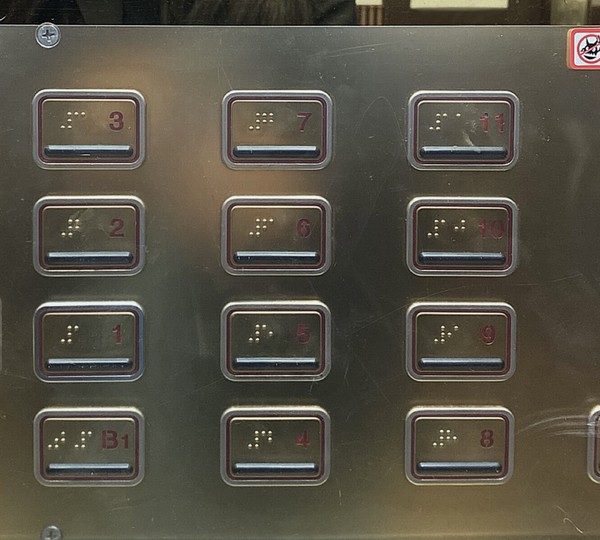Photologue @theuostimes7
Due to the prolonged COVID-19 crisis, preventive items such as masks and antibacterial films have become daily necessities. However, there are other people who suffer from these kinds of anti-epidemic products: the disabled.
The antimicrobial film covering surfaces in public areas such as elevator buttons has become a common sight in South Korea throughout the COVID-19 crisis. It contains antimicrobial agents that inhibit and neutralize the growth of microbes on its surface. Also, the antibacterial design provides a surface that inhibits the growth of pathogens.
However, the antibacterial film is becoming an obstacle for blind people who must read the information in braille. For the blind, Antibacterial film is not just a quarantine tool, but an obstacle that harms their right to mobility and access. Blind people say they can feel that the buttons have braille, but it takes a long time to find and press the buttons because it is difficult to distinguish braille. To put it simply, 3 has two dots in braille, and 13 has three dots, but it is hard to know the shape or number of braille at once because it is covered by film. Also, depending on the condition of the antimicrobial film, the sense of the touch varies greatly.
Blind people demand that there should be a consideration for minorities from the policy introduction stage. The antibacterial film currently in use is preventing blind people from accessing information and their right to movement. They argue that movement is the basis of all life for survival and exchange and that raising inconvenience about this is never a small problem.
The most likely alternative for blind people is brailled label stickers. Thus, the Haemil Library in Bucheon produced and distributed antimicrobial braille stickers in elevators to public institutions in Bucheon.
Regarding this problem, welfare experts for the disabled and social welfare experts say that the government should expedite the commercialization of braille antibacterial films. In response, the Seoul Metro said, "The construction is also concerned about the difficulty of touching braille by the blind, but we have yet to find an alternative."
For the blind, a non-face-to-face society is another crisis. Recently, people can enter restaurants or stores with a digital customer register, QR code based entry logs. Blind people, however, have a hard time using QR code on their own if no one helps them. Also, it is not easy to identify the movements of confirmed cases. This is because the government supplied information on routes is an image file.
There are so many cases of people with disabilities being harmed in quarantine policies. This is because no careful attention and consideration were taken to the disabled or the elderly in the planning and implementation of universal anti-epidemic policies. In order to create a society where individual dignity is respected, careful policy consideration should be taken to prevent any people from being harmed.

https://www.instagram.com/p/CF53a2njHLj/?utm_source=ig_web_copy_link

